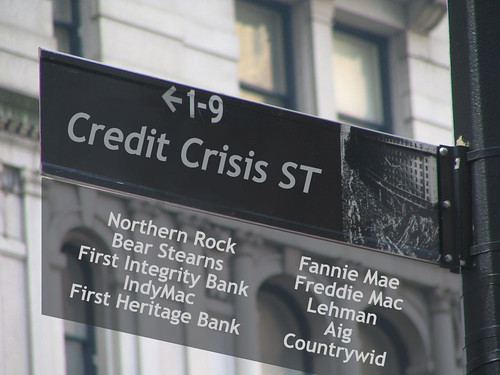Let’s imagine there’s a world with 1 million people (easy numbers for my poor maths).
Each person has £1000 in savings and is paid £100 per annum to work for one of 100 companies. (You could make it more realistic, but the maths, the maths!)
Ten of those companies are banks.
So…
Each company employs 10,000 people (including the bosses) and pays out £1m in wages. So has to make at least £1m a year to keep going.
It makes things that the 1 million people buy…with their £1000 savings and/or their £100 wages.
Ten companies look after all this money. £1000m in savings and £1m in current (checking) accounts. They have to take out of the system £1m to pay their staff, but of course each £100 goes into other companies – like supermarkets, car dealers etc and then ends up back in one of the ten banks.
I don’t speculate on the value of the companies – there is only so much money to go around so it’s irrelevant.
Some companies will be good at bringing in money and others will go short. The former will bank the money (or spend it) and it will still end up in a bank. Where the latter kind of company might ask to borrow it.
If they end up not being able to pay it back, they’ll go bust. But the money will still be in the system.
So, my question is this, how do they screw up?
Explanations for the hard of thinking, welcome. And feel free to elaborate on my model.
Thursday, October 09, 2008
You'd never know I studied economics once
Thursday, October 02, 2008
Extremely Social Marketing

Just got back from Brighton where the first 'World Social Marketing Conference' was held at the Metropole.
I didn't see much of the sea but the event itself was fascinating for all kinds of reasons.
First of all, I met and spoke with Philip Kotler. I have to get this fact out of the way because my colleagues are all ribbing me about this. Whatever you think of the guy I can assure you he seems nice enough - even when I started telling him about my research. He stayed awake anyway.
There's no doubt that social marketing is a large and growing sector.
It's an area Nick and I are realising (slowly I know) that we are working in more often than not.
To present marketing - in our writing, consultancy or teaching - as just commercial, profit-focused is not only undesirable, it's inaccurate.
In Marketing & PR we made sure we discussed how small businesses and nonprofits could benefit from clear marketing thinking. In the forthcoming Virtually Free we likewise apply sound marketing principles to all kinds of organisations.
In any case, very few business people rush to work simply to make money.
We know that, for many of us, money is a 'hygiene factor' [it's a kind of minimum requirement] but it's not a motivator. Of course as you take hygiene factors away you can start to 'disincentivise' work. As you build up motivators, you get more and more committed and industrious.
The World Social Marketing Conference was packed with highly motivated people, marketers, from agencies, nonprofits, universities and other, hybrid, organisations.
I came away enthused. Eager to do more with the knowledge we have at PWOTG.









